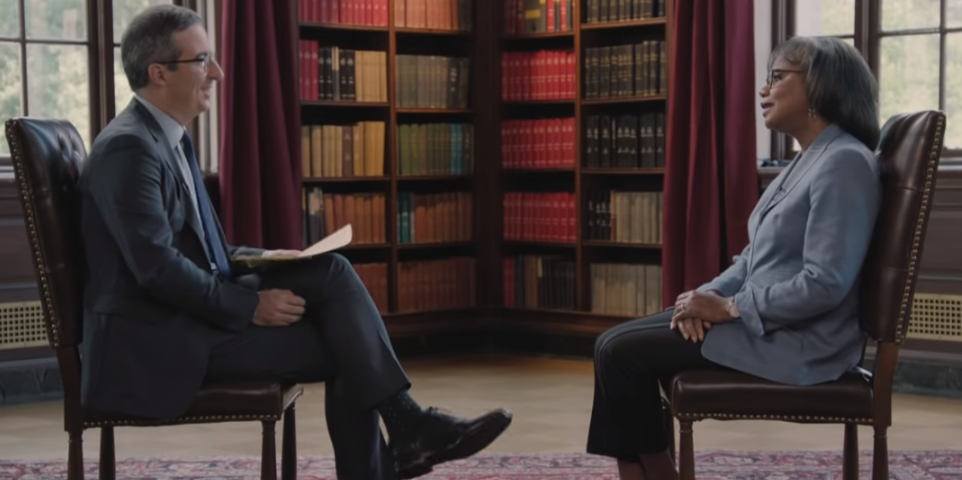
In a recent episode of award-winning John Oliver’s Last Week Tonight, the comedian tackled the issue of sexual harassment in the workplace. The episode was extended to include an interview with Anita Hill, famous for her case against Judge Thomas in 1991. While extremely funny, John Oliver’s take on sexual harassment, coupled with his interview with Anita, gave light to the issues of sexual harassment, the progress, if any, made on tackling the issue over the last three decades and what we can do address it. Here are a few things you may have learned from the episode.
1. There is no reason to fear hiring women
While John Oliver ridicules a man who asks “what are the rules?”, there does seem to be a recurring theme throughout the episode – men are worried they will be wrongly accused of sexual harassment. Author and life coach Tony Robins recently came under fire for his anecdote of a man who wouldn’t hire a woman because she was very attractive and it would be “too big a risk”. This fear can be abated by providing clear guidelines on what is considered inappropriate behavior. Combating sexual harassment starts with ensuring a culture of awareness and sensitivity towards the problem. Anita Hill emphasized this, saying that while there are a tiny amount of false accusations, we mustn’t “make rules around the things that rarely happen until we finish up making the rules around the things that are happening regularly.”
2. Fines and commitments alone aren’t enough
John jokes that “it does seem that we are on the verge of a reckoning about sexual harassment.” He highlights Ford’s commitment to change their corporate culture and the $10.1M in fines to settle harassment allegations, a wave of women running for office in “the year of the woman” and “Times up” was a theme in this 2018’s Oscars. The viewer’s hopes are raised, only for him to remind us that the same theme rang in the past, with Ford promising to change their corporate culture in 1999 and 1992 being dubbed the “Year of the Woman”, not to mention Liza Minnelli’s 1992 hit that includes the words “Hillary will lead the way”. Of course, this raises the question “has anything changed?”
3. Workplace sexual harassment training videos haven’t worked
One thing that is clear from this episode of Last Week Tonight is that traditional sexual harassment training, particularly training videos, has not worked. What is the solution? Well, according to Anita Hill, improving workplace culture is key to stopping sexual harassment. She also says that the law needs to go further to take the pressure away from the victim, saying “One of the things that so often happens is that the law around discrimination relies on intent—did they intend to harm you? Well, if you’re a victim, it doesn’t matter much [what the other person] intended.” This is an issue which is now being addressed with New York State and City laws coming into force over the next few months. For example, under the Stop Sexual Harassment in NYC Act, all employers, regardless of size, are covered regarding claims of gender-based harassment. Under the upcoming New York State law, the decision on confidentiality is put in the hands of the person making the claim of harassment.
4. Victims need to feel comfortable speaking to HR
John points out that those who are subject to sexual harassment or inappropriate behavior do not always feel comfortable filing a complaint with HR. This is partly because HR is responsible for protecting their business from liability. For example, a Battalion Chief from the US Forest Service explained that someone who brings up inappropriate behavior adopts the title of “that girl”. Organizations must have processes in place that allow employees to raise concerns of inappropriate behavior, be it towards them or a colleague.
Measure your perception of sexual harassment in your workplace
5. There are no innocent bystanders
One of the most powerful reflections from Anita was her view on people who see the inappropriate behavior and do nothing about it. She said “if you see something wrong, and you don’t do anything about it, it’s as if you participated.” Sexual harassment training must not only train on inappropriate behaviors, but it must empower people to notice unwanted behaviors and take action on it, which could vary from offering assistance to the recipient of the behavior to filing a complaint with HR.
6. Businesses should publicize sexual harassment policies
One of the last questions asked by John in his interview with Anita was how businesses can improve the workplace culture and tackle sexual harassment for good. Anita responded by saying organizations should publicize their policies and make clear the process of filing a complaint, such as the questions that they will need to answer. This will help people feel that their complaint will be taken seriously and that it won’t affect their position in the workplace. She also accepts good people may not know what to do and advises that businesses provide bystander training to provide guidance on behavior that would be considered inappropriate and what to do in these situations.
VinciWorks’ new training on sexual harassment and bullying at work
VinciWorks’ new harassment course, MyStory: Harassment and Bullying at Work, directly applies the lessons of the #MeToo movement to the training sphere. The course does not subject users to legalistic definitions of harassment. Instead, it brings to life the real impact of bullying and harassment at work through hard-hitting stories, connects users to a global movement, and gives them a chance to have their story heard too. You can try the course for free here.








